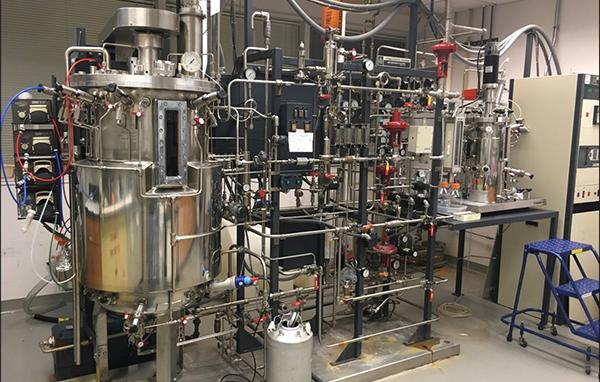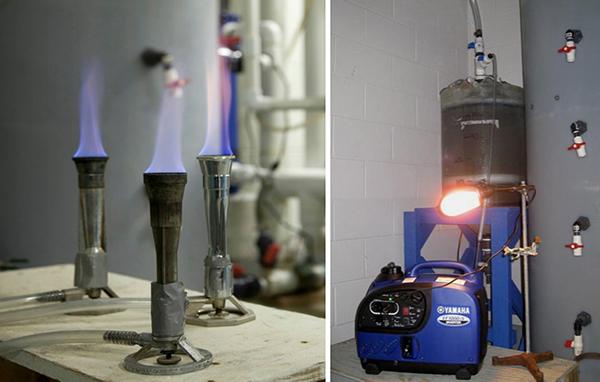Land-based production of Atlantic salmon uses recirculating aquaculture systems (RAS) technology to grow fish in a self-contained environment. RAS technology offers the ability to effectively capture wastes and recycle water thus reducing environmental impact, enhance biosecurity to prevent fish escapes, minimize pathogen entry or spread into the environment, and highly control the tank environment for increased fish performance and health. RAS requires specialized equipment and technologies designed to provide the fish with optimal water quality and control. A diagram and simple breakdown of these components can be explored by visiting the Recirculating Aquaculture Salmon-Network (RAS-N) website.
Most of the Atlantic salmon consumed by Americans is imported. RAS technology allows Atlantic salmon to be raised on land, including the middle of the country, where fresh fish is less accessible. This also means fish can be raised in closer proximity to major markets and population centers, effectively reducing food miles observed with imports. The expense of RAS is substantial, however, and requires intensive business planning and marketing strategies to produce at a scale necessary to be economically viable. Still, there are at least a dozen commercial ventures around the world producing market-size salmon in land-based RAS. Many more are investing in this emerging industry, including production in the United States. In Maryland, Caroline County is a proposed site for land-based Atlantic production.
Dr. Catherine Frederick works with a national network of specialists in land-based RAS to help foster the growth of domestic Atlantic salmon production called the Recirculating Aquaculture Salmon Network (RAS-N) and you can learn more by visiting their site. Her role in this organization has been to assess industry needs and priorities but will expand her work to the public in a new project titled Sustainable Aquaculture Systems Supporting Atlantic Salmon(SAS2). SAS2 is a multi-regional and international effort to tackle industry bottlenecks (research), support workforce development (education), and connect with the public and communities where production is taking place or proposed (extension). Dr. Frederick’s role is to assess community needs and concerns regarding the commercial development of land-based Atlantic salmon RAS, as well as connecting end-users with ongoing research and industry status updates. More on this project can be found in an article on the UMBC news page.
 English
English العربية
العربية Български
Български 简体中文
简体中文 繁體中文
繁體中文 Hrvatski
Hrvatski Čeština
Čeština Dansk
Dansk Nederlands
Nederlands Suomi
Suomi Français
Français Deutsch
Deutsch Ελληνικά
Ελληνικά हिन्दी
हिन्दी Italiano
Italiano 日本語
日本語 한국어
한국어 Norsk bokmål
Norsk bokmål Polski
Polski Português
Português Română
Română Русский
Русский Español
Español Svenska
Svenska Català
Català Filipino
Filipino עִבְרִית
עִבְרִית Bahasa Indonesia
Bahasa Indonesia Latviešu valoda
Latviešu valoda Lietuvių kalba
Lietuvių kalba Српски језик
Српски језик Slovenčina
Slovenčina Slovenščina
Slovenščina Українська
Українська Tiếng Việt
Tiếng Việt Shqip
Shqip Eesti
Eesti Galego
Galego Magyar
Magyar Maltese
Maltese ไทย
ไทย Türkçe
Türkçe فارسی
فارسی Afrikaans
Afrikaans Bahasa Melayu
Bahasa Melayu Kiswahili
Kiswahili Gaeilge
Gaeilge Cymraeg
Cymraeg Беларуская мова
Беларуская мова Íslenska
Íslenska Македонски јазик
Македонски јазик יידיש
יידיש Հայերեն
Հայերեն Azərbaycan dili
Azərbaycan dili Euskara
Euskara ქართული
ქართული Kreyol ayisyen
Kreyol ayisyen اردو
اردو বাংলা
বাংলা Bosanski
Bosanski Cebuano
Cebuano Esperanto
Esperanto ગુજરાતી
ગુજરાતી Harshen Hausa
Harshen Hausa Hmong
Hmong Igbo
Igbo Basa Jawa
Basa Jawa ಕನ್ನಡ
ಕನ್ನಡ ភាសាខ្មែរ
ភាសាខ្មែរ ພາສາລາວ
ພາສາລາວ Latin
Latin Te Reo Māori
Te Reo Māori मराठी
मराठी Монгол
Монгол नेपाली
नेपाली ਪੰਜਾਬੀ
ਪੰਜਾਬੀ Afsoomaali
Afsoomaali தமிழ்
தமிழ் తెలుగు
తెలుగు Yorùbá
Yorùbá Zulu
Zulu ဗမာစာ
ဗမာစာ Chichewa
Chichewa Қазақ тілі
Қазақ тілі Malagasy
Malagasy മലയാളം
മലയാളം සිංහල
සිංහල Sesotho
Sesotho Basa Sunda
Basa Sunda Тоҷикӣ
Тоҷикӣ O‘zbekcha
O‘zbekcha አማርኛ
አማርኛ Corsu
Corsu Ōlelo Hawaiʻi
Ōlelo Hawaiʻi كوردی
كوردی Кыргызча
Кыргызча Lëtzebuergesch
Lëtzebuergesch پښتو
پښتو Samoan
Samoan Gàidhlig
Gàidhlig Shona
Shona سنڌي
سنڌي Frysk
Frysk isiXhosa
isiXhosa


